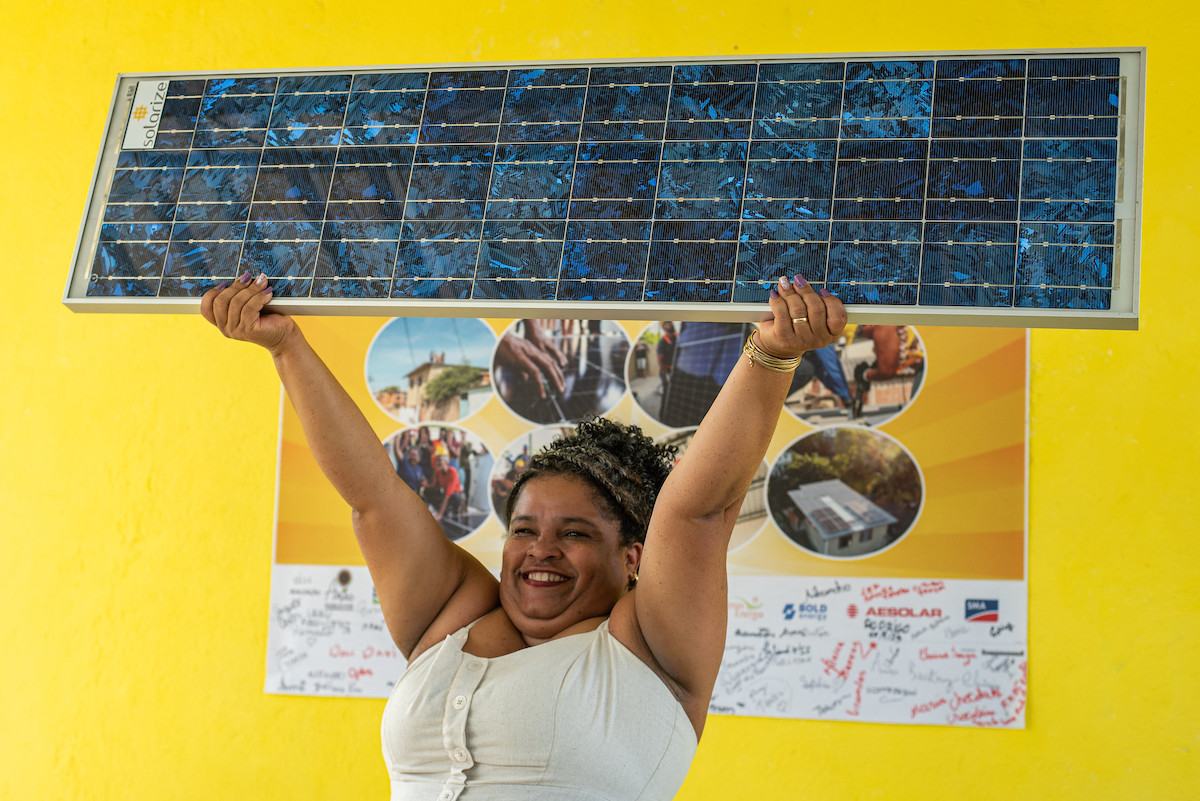
On Sunday, September 17, the community-based Association of Women With Attitude and Social Commitment (AMAC) celebrated the launch of the first photovoltaic system in the favelas of Duque de Caxias, a municipality in Greater Rio de Janeiro’s Baixada Fluminense region. Founded 13 years ago in Dique da Vila Alzira favela, AMAC is a community-based NGO with the mission of defending women’s rights and fighting domestic violence. Expanding beyond this mission to include efforts to achieve socio-environmental solutions for the community, as a member of the Sustainable Favela Network (SFN), the organization has been expanding its role. This search led to the recent installation of photovoltaic panels to provide solar energy to AMAC’s headquarters.
In collaboration with the SFN and other members—Solarize and Revolusolar—the solar installation at AMAC was part of a larger program which also included a Mini-Course for Solar Energy Ambassadors. This course trained over 120 community organizers and allies. It was conducted online and culminated in an in-person session at AMAC on August 12, the day of the photovoltaic installation.
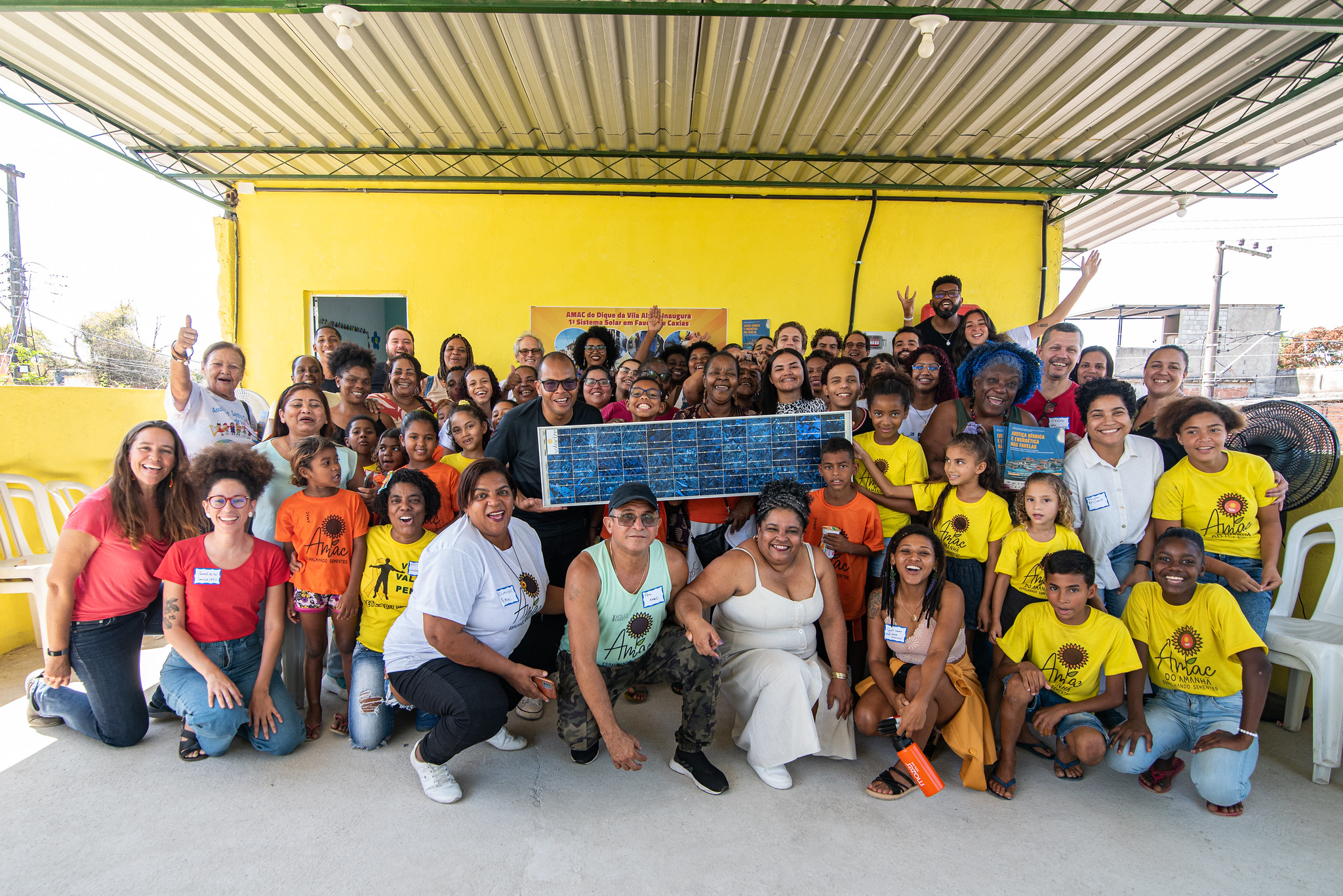
On September 17, the official launch involved a press conference and was attended by residents, allies, and other project leaders. The opening talk was given by Nill Santos, president of AMAC.
“Today is a very special day, because yesterday (09/16), we [AMAC] completed 13 years of existence, and today is our day of celebration. And there’s nothing more beautiful than celebrating this occasion with the launch of solar panels. As you all know, I arrived in this area in 1982, and when I got here, we had neither water nor electricity. And yet we are here today, in this community, implementing solar energy in a territory where public authorities may not see us but where social power is strong, is potent!” — Nill Santos
After the opening, others shared their experiences and expectations of the process, which was a milestone in the pursuit of energy justice. They expressed the importance of solar energy, as a form of clean energy that generates jobs and that aligns with new perspectives on building decentralized, popular, and autonomous energy alternatives. Gisele Moura, coordinator of the SFN’s managing team, spoke contextualizing the project within the network’s climate justice priorities.
“In 2021, we were invited to brainstorm an umbrella project for climate justice in the favelas. During this process, we convened for many hours to think about a far-reaching climate justice initiative. We came up with three axes: research, infrastructure, which involves solar panels, and exchanges, where we foster dialogues between communities… Today, we are realizing a part of this expansive project, which was built collectively. It included a mini-course conducted by the Revolusolar team, where over 20 organizers [from other favelas] were able to observe the installation process here at AMAC. So, every part of this construction has been a collaborative effort. The entire network is here together.” — Gisele Moura
After Moura spoke, residents who learned the trade of installation as they participated in the process at AMAC talked about their takeaways and goals. Among them was cabinet installer Edize Maria Santos, resident of Cangulo, a community neighboring Dique.
“It’s very satisfying to be here at AMAC today and see this accomplishment. I had prepared a speech, but I’m going to use my own words. As a favela, we think that it’s impossible [to install solar energy]. But it isn’t, because we’re right here, in the fight, in the battle. I met amazing people who share the same goal of making the world a better place through clean energy. They’ve shown us that we really can make it happen, showing that everyone can set up their own system.” — Edize Santos
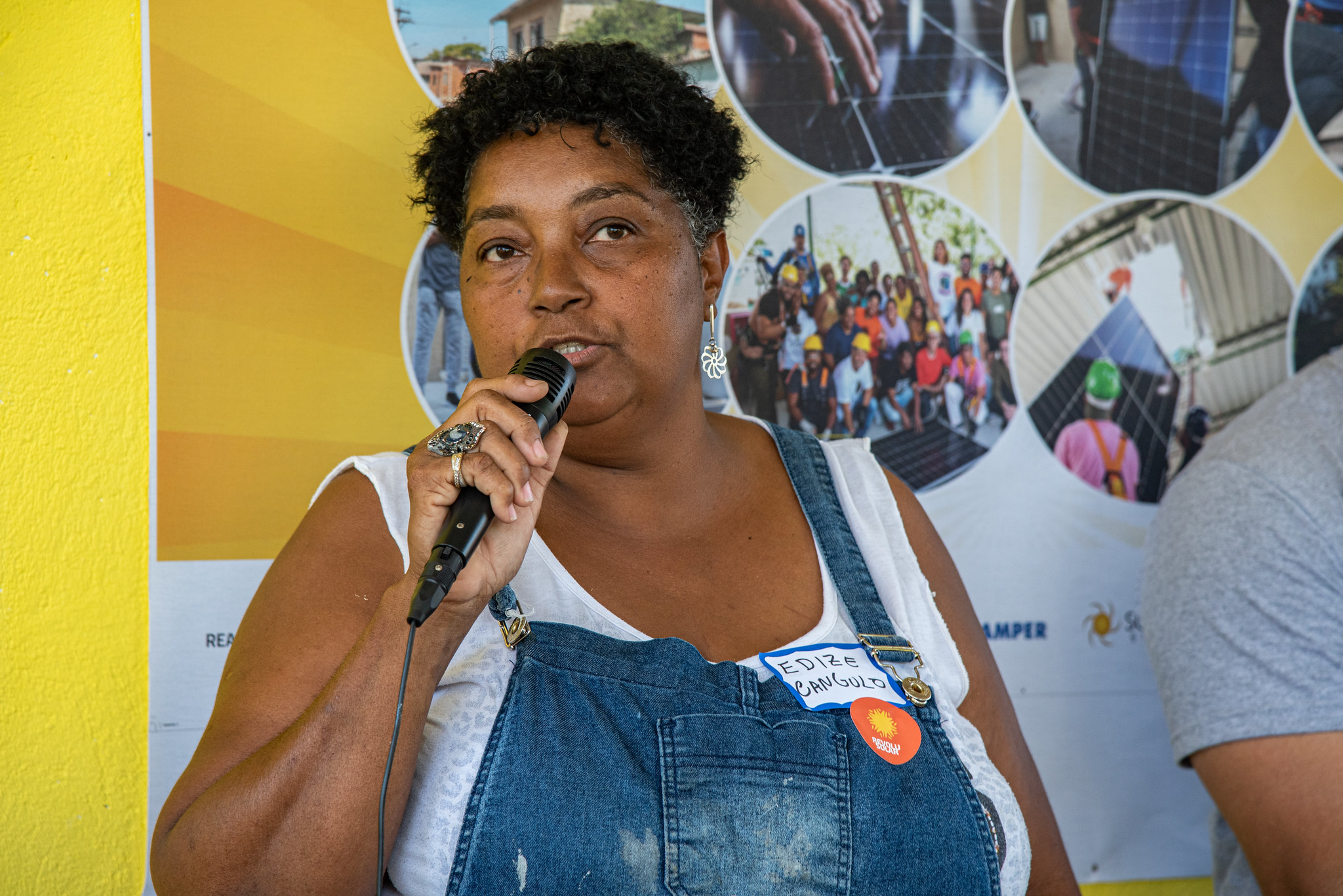
The project’s technical partners were then called up. Hans Rauschmayer, of Solarize, said that solar energy in Brazil is still underutilized, corresponding to only 2% of the nation’s energy. He elaborated on how this technology, along with being clean and sustainable, generates jobs and income for the territories.
“Solar energy in Brazil has already generated a million jobs in only eleven years. We can create jobs anywhere because Brazil is enormous. It has cities, rural areas, favelas, urban areas—everything. And wherever you go, somebody will [need to be employed to] install solar energy. In all these places, you need people to get on the roof, it’s as simple as that; we don’t have robots to do that. So, it really is an energy source that generates many jobs. You need engineers, electricians, and installers, who don’t need all that much schooling to earn a good living this way.” — Hans Rauschmayer
Revolusolar spoke about the methodology their team has developed through installations in favelas and communities all over Brazil.
“The methodology we’ve created through various projects in partnership with Solarize, and now with the Sustainable Favela Network and AMAC, is [based on] this unity. It’s not just about putting up a solar panel: it’s about training; generating jobs; providing autonomy and agency; empowering leaders to take advantage of the entire solar energy revolution and to understand what it can bring, beyond a reduction in the electric bill.” — Eduardo Avila
Adriano Paraiso, also from Revolusolar, highlighted that their motivation in realizing these socio-environmental projects is something deeper, namely the quest for local social empowerment.
“I always say that Revolusolar is about more than solar energy; it’s about human energy… Yesterday, when we were setting up the space, I had the chance to chat with Nill about how what we’ve done here transcends saving energy and this system above us. Nill fought hard to be here, and from everything that she has suffered in life, she could have been a totally different person. Yet, she chose the path of justice, of doing right by others.” — Adriano Paraiso
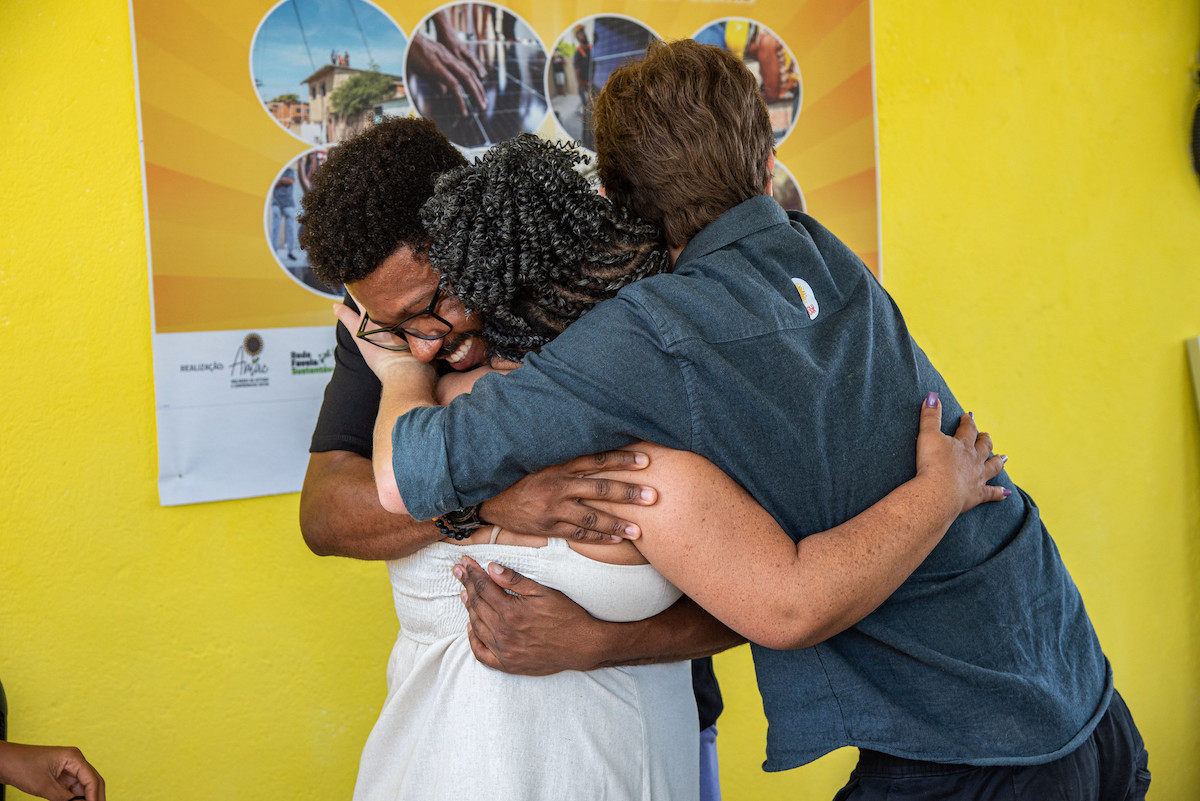
A few young people who participate in the Sustainable Favela Network’s energy justice initiatives also offered their thoughts on the installation of solar panels. Larissa Ricardo, a Dique da Vila Alzira resident, delivered a compelling testimonial that captured everyone’s attention.
“I came here to congratulate Nill and everyone who contributed… Speaking as a young woman, I’m really surprised and happy to witness this today. We couldn’t have imagined a solar capture system being launched on the roofs of a favela, in the periphery. So, I’m very honored to be here, to be a part of this, especially having children here too, understanding how important our connection to the environment and the future is. People look at me and say, ‘a resident of Dique.’ I used to be ashamed. Today, seeing the transformation here, I’m proud to say that I’m a resident because my community is the first in Duque de Caxias to launch a solar system.” — Larissa Ricardo
Following various testimonials, with the event approaching its end, Nill Santos delivered another heartfelt talk about the fight being worth it and not giving up on dreams. She addressed all the children who study and participate in activities at AMAC, ending with a powerful conclusion.
“I like to say that we are all sunflowers; the sunflower is always facing the sun and its seeds are capsules of energy. Once again, the sun shone brightly today, as it did on the day the panels were installed; and the seeds [children] are here. This is the seed. This is the new generation that will blossom: men and women, who know they have equal rights, building a much better future.” — Nill Santos
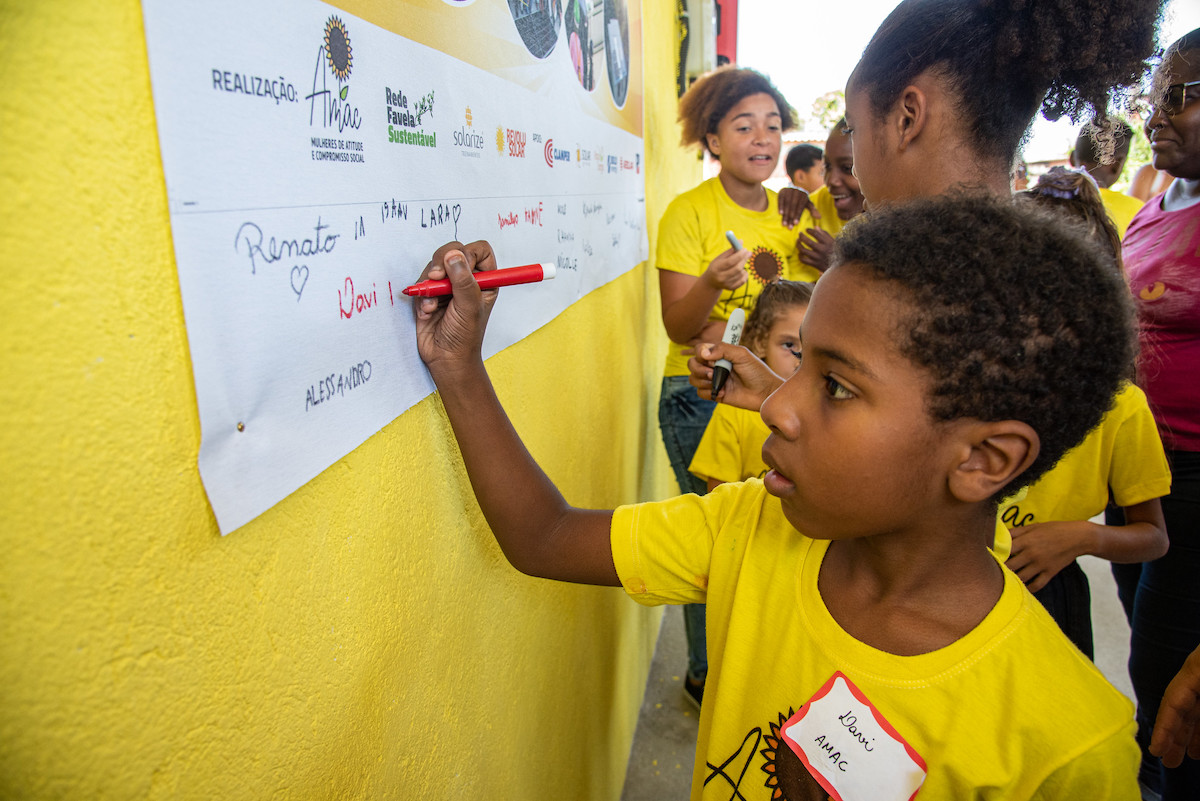
Initiatives like the installation of solar panels in Duque de Caxias point to a new horizon for the Dique da Vila Alzira community. Locals’ strength, allied to partners that support their autonomy, marks not only the start of an energy revolution, but, above all, a commitment to a greener and more sustainable future for the territory.
Watch the videos of the launch event here (without English subtitles).
View the photos of the launch event here:
About the author: Bárbara Dias was born and raised in Bangu, in Rio’s West Zone. She has a degree in Biological Sciences, a master’s in Environmental Education, and has been a public school teacher since 2006. She is a photojournalist and also works with documentary photography. She is a popular communicator for Núcleo Piratininga de Comunicação (NPC) and co-founder of Coletivo Fotoguerrilha.

